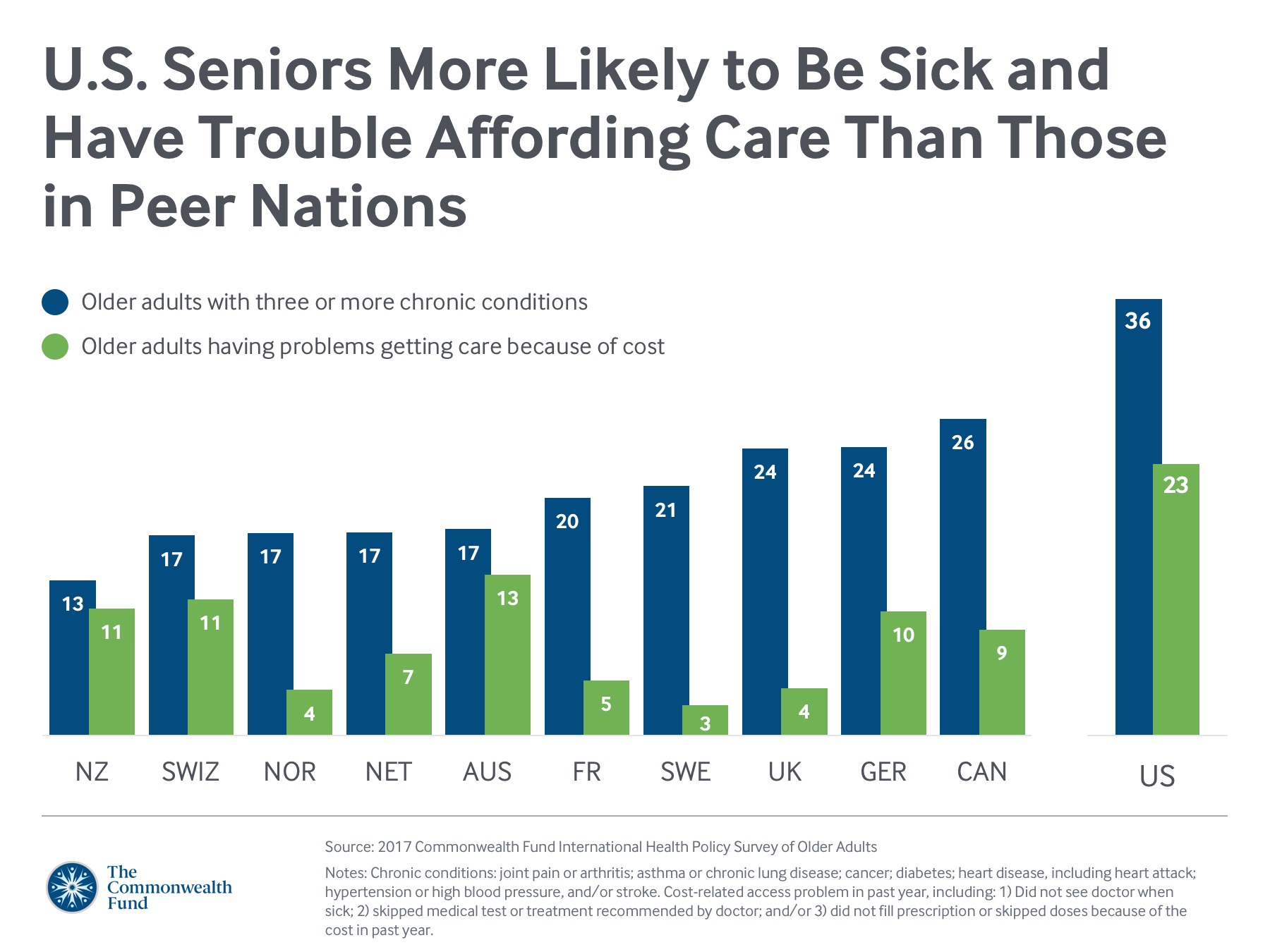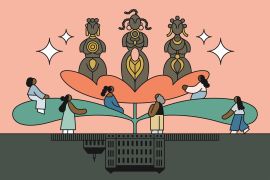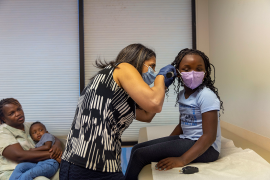New York, NY, November 15th, 2017 — Despite having nearly universal health coverage through Medicare, adults 65 and older in the United States are sicker than those in other countries and are more likely to go without needed care because of costs, according to the Commonwealth Fund’s 20th International Health Policy Survey, out today in Health Affairs.
 The survey compared the health care experiences of older adults, including those with the highest medical needs, in Australia, Canada, France, Germany, the Netherlands, New Zealand, Norway, Sweden, Switzerland, the United Kingdom, and the U.S. It found that in the last year, 23 percent of U.S. seniors, citing costs, didn’t go to the doctor when they were sick, didn’t fill a prescription or skipped a dose, or didn’t get a recommended test or medical treatment. In France, Norway, Sweden, and the U.K., no more than 5 percent of seniors skipped needed care because of costs.
The survey compared the health care experiences of older adults, including those with the highest medical needs, in Australia, Canada, France, Germany, the Netherlands, New Zealand, Norway, Sweden, Switzerland, the United Kingdom, and the U.S. It found that in the last year, 23 percent of U.S. seniors, citing costs, didn’t go to the doctor when they were sick, didn’t fill a prescription or skipped a dose, or didn’t get a recommended test or medical treatment. In France, Norway, Sweden, and the U.K., no more than 5 percent of seniors skipped needed care because of costs.
“Because all U.S. adults 65 and over qualify for Medicare, they are the only group in our nation that has universal health insurance coverage,” said Robin Osborn, lead author of the study and Vice President and Director of the International Program in Health Policy and Practice Innovations at The Commonwealth Fund. “Yet U.S. seniors face more financial barriers to care than those in other countries, and are, in effect, hit with a triple whammy — higher health care costs, higher out-of-pocket costs, and because the U.S. doesn’t invest heavily in social services, they are more likely to struggle to have their basic needs met. If we want to better protect our seniors, we need to both address shortfalls in Medicare and invest more in social services.”
U.S. Seniors Face Especially Challenging Combination of High Health Care Costs and Having Basic Needs Met
According to the survey, U.S. seniors face a unique combination of high health care costs, substantial economic challenges, and limited social supports. Prior research has shown the U.S. invests significantly less in social services than other wealthy nations. For example:
- Nearly one in four U.S. seniors (22%) spent $2,000 or more out-of-pocket for health care in the past year. Only Swiss seniors were more likely to spend that much, with 31 percent reporting high spending. Among all remaining countries, fewer than 10 percent of seniors spent $2,000 or more.
- Among seniors saying they needed help with daily activities of living such as eating and dressing, nearly a quarter (24%) of those in the U.S. said they didn’t get the help they needed because of cost. In contrast, six percent or less in Sweden, France, the Netherlands, and the U.K. reported not getting the help they need.
- Twenty-five percent of older adults in the U.S. reported that they were often worried about having enough money to buy nutritious meals or pay their rent or bills for electricity or heat, or had serious problems paying their medical bills. In contrast, 10 percent or less in France, the Netherlands, New Zealand, Norway, Switzerland, Sweden, and the U.K. reported concerns about being able to afford these basic needs.
Caring for Sickest Seniors a Common Struggle for Wealthy Nations
When looking specifically at older adults who are “high need” either because they had multiple chronic illnesses and/or trouble with the basic activities of daily living, the study found that, across nations, many are dissatisfied with the quality of their care. In Australia, 41 percent were somewhat or not at all satisfied, compared to 26 percent in the U.S. and 21 percent in Switzerland, the country that did best.
U.S. seniors who were sickest were also the most likely to struggle to make ends meet. High-need U.S. seniors struggled significantly with costs: 31 percent skipped care because of costs, compared to only 2 percent in Sweden, and nearly one-third worried about having enough money for healthy meals, rent, or other bills. Still, high-need seniors in other nations struggled as well, with about a quarter of those in Australia and Germany also reporting that they worried about affording food, rent, or other bills.
Many high-need seniors also suffer from anxiety or depression, which can lead to poorer health outcomes and higher costs. Approximately one-quarter or more of high-need seniors in every country except Sweden (15%) reported emotional distress such as depression or anxiety.
Additional Survey Findings
- Older adults in the U.S. (15%) and Canada (11%) were the most likely to report going to the emergency room for a condition that could have been treated by a regular doctor or place of care had one been available. In contrast, rates of avoidable ER visits were 8 percent or below in all other countries surveyed.
- The U.S. does well on health promotion activities, with 53 percent of seniors with a regular doctor or place of care reporting their doctor talked to them about exercise and healthy eating — the highest rate for this measure in the survey. In addition, 63 percent of U.S. seniors who feel they are at risk for falls reported that their doctor discussed fall risks with them; only seniors in Australia (63%) and France (65%) were equally, or more, likely to say their doctors discussed fall prevention.
- Social isolation is a significant concern for older adults: more than one in eight respondents in Norway (12%), the Netherlands (13%), and France (15%) reported living alone and feeling socially isolated “often” or “some of the time,” with lower rates in the other countries.
Moving Forward
The authors note that all the nations surveyed are challenged with providing the best possible health care to their seniors, many of whom are very sick and struggle with basic daily tasks like eating and dressing. They point to the importance of learning from other countries’ best ideas as well as from mistakes. The U.S. in particular, they say, has much to gain from examining countries where universal health care begins at birth and where investments in social services such as food and housing support result in lower health care spending.
“This survey asks seniors around the world, ‘What is it like to age and be sick in your health care system?” said Commonwealth Fund President David Blumenthal, M.D. “Clearly there are struggles everywhere, but here in the U.S. we are hearing loud and clear that many of our seniors, especially those who are sickest, need more support if they are going to get the health care they need and live healthy lives.”
|
Methodology SSRS, in collaboration with country contractors, surveyed nationally representative samples of adults ages 65 and older in eleven countries. Interviews were conducted March through June 2017 by telephone (mobile and landline) and also online in Switzerland to improve representativeness. Field times in each country ranged from seven to fourteen weeks. The overall response rates ranged from from 15 percent (Norway) to 52 percent (Netherlands). International partners joined with the Commonwealth Fund to sponsor country surveys, and some countries supported the use of expanded samples to enable within-country analyses. Final country population samples ranged from 500 to 7,000. Data were weighted to ensure that final estimates were representative of the adult population age sixty-give and older in each country. Weighting procedures took into account the sample design, probability of selection, and systematic nonresponse across known population parameters including region, sex, age, education, and other demographic characteristics. |
| The Commonwealth Fund is a private, nonprofit foundation supporting independent research on health policy reform and a high performance health system. |


